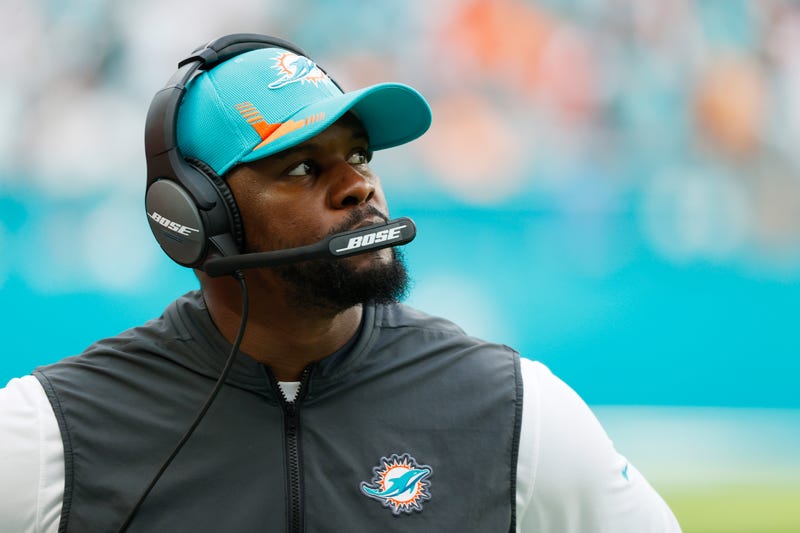
PHILADELPHIA (KYW Newsradio) — Brian Flores was recently fired as head coach of the Miami Dolphins after three seasons, leading Miami to winning records the last two years.
Now he has filed a class-action lawsuit against the NFL and three teams including the Dolphins, alleging racial discrimination in a league that only has one Black head coach among its 32 teams - the Steelers' Mike Tomlin.

"The goal, at least stated, of Flores is to affect change," said Andrew Brandt, executive director of the Moorad Center for the Study of Sports Law at Villanova University, host of the Business of Sports podcast, and former vice president of the Green Bay Packers.
"Whether this suit wins or loses, that's the judge of it, not how much money Flores gets."
The Flores lawsuit involves numerous allegations that Dolphins Owner Stephen Ross paid him to lose games, a similar charge recently made by former Cleveland Browns coach Hue Jackson, whom Brandt said could join the class action suit.
Flores also said he has evidence that New England Patriots coach Bill Belichick contacted him for getting the head coaching role with the New York Giants, before he ever interviewed for the position and before the Giants announced any hiring of a coach.
Belichick realized he was trying to reach former Bills offensive coordinator Brian Daboll, who eventually got the job, and not Flores.
"The upshot of that is that Brian Flores had no shot at the Giants job when he interviewed, thus a sham interview," said Brandt.
"Other people, I think I'm pretty sure, interviewed after that text. So it wasn't just Brian Flores that had a sham interview; other white coaches, too."

Brandt believes this reveals how much of the NFL coach-hiring process involves owners who have their minds already set on a particular coach, and only conduct sham interviews to follow league rules. Those include the Rooney Rule, where every team attempting to hire a coach must interview a minority candidate.
"If you get an owner saying 'Come hell or high water, I'm getting that coach,'" said Brandt, 'then everyone's a sham."
"I don't know how to answer when an owner has a 'zen' for a coach. How do you ensure these other ones are going to be meaningful interviews? I don't have an answer."
That process has led to minority coaching candidates such as Flores, Jim Caldwell (who led the Colts to a Super Bowl appearance in 2009), Teryl Austin, Eric Bienemy, Todd Bowles, Marcus Brady, Patrick Graham, Jerry Gray, Byron Leftwich, and Jerod Mayo often being recognized as highly-qualified candidates and receiving interviews for head coaching jobs, but almost never hired.
Additionally, NFL teams' firing of Black and other minority coaches could be part of the class-action lawsuit. Brandt has observed a pattern of white coaches sometimes lasting longer than minority coaches who have the same record of success.
Flores is an example, as his last two years with the Dolphins ended with winning records (10-6 in 2020, 9-8 in 2021).
Since 2017, there have been 39 instances of teams having consecutive seasons with winning records.
Only Flores was fired after those consecutive winning seasons.

All this in an NFL whose 31 for-profit ownership groups, each of which are worth billions of dollars, include no Blacks as majority owners or principal managing partners. (The Packers are a non-profit stock company with more than 360,000 fan shareholders.)
"The snapshot is not good, but you'd like to think it's not a representation of the effort going into diversity," said Brandt, who was part of a Packers organization that became much more diverse during his tenure in the NFL city with the smallest Black population percentage.
"I worked for the only team that didn't have an owner, but I can see how ownership and their families feel like maybe they're above everything."
This lawsuit may test that theory, though Brandt doesn't believe owners are highly concerned.
"A lot of people think that NFL owners are quaking in their boots about this because of the discovery phase of the lawsuit," said Brandt about the process of gathering documents, communications records, and other evidence for the suit.
"We said this about the concussion lawsuit, the Kaepernick lawsuit, the St. Louis (Rams relocation) lawsuit, the Brady lawsuit, the Ray Rice lawsuit. We've never seen discovery on the NFL. They must have great lawyers, but I don't think they're quaking in their boots."
Brandt believes the class action suit could head to court this fall.




